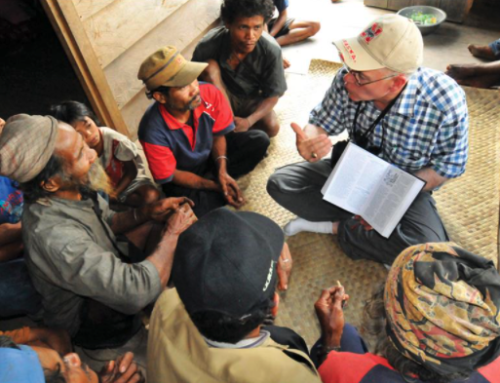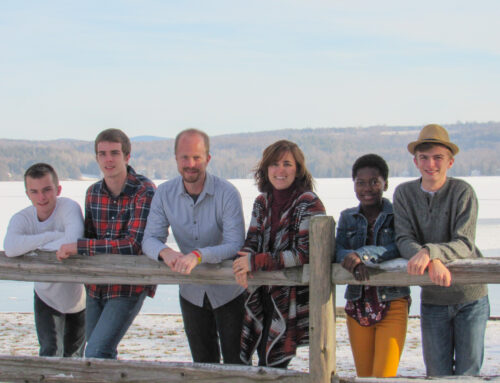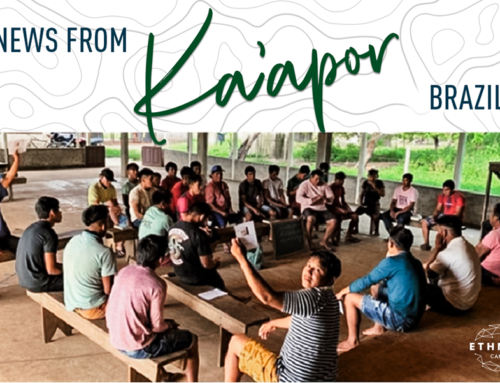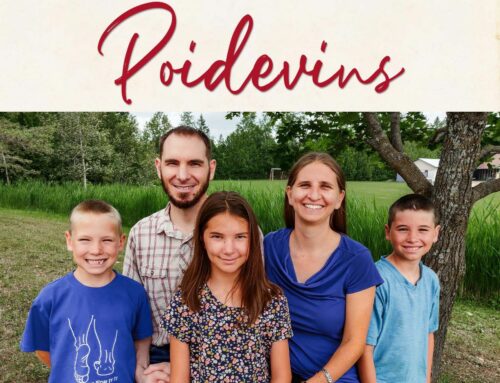God’s Word is the focus of Rachel’s long upriver journeys.
Rachel Searcy’s friend, Hinon Mina, was excited when she headed upriver with Rachel to share the gospel. She told Rachel that the new lesson from Acts translated into Punan helped her “so that I do not want to give up easily.”
The specific verse she cited was the Punan translation of Acts 20:24. Translated back to English, it says, Even though I know that I will experience suffering … I do not value my life if only I can do the work that Jesus … has commanded me to do … to travel telling people about the Good News about God’s care and generosity (literally, good-throatedness) to us mankind to the point He gave Jesus to come down to this world …
Hinon Mina is Rachel’s co-worker in a ministry six hours upriver by boat from the nearest town. Rachel travels to this remote village periodically, most recently for five weeks to work on the Punan translation of the book of Titus.
Rachel and a group of five or six Punan co-workers typically translate most of the day. Members of the church donate rice and ladies in the church prepare meals for the translation team. The tribal people do not grow vegetables so Rachel takes a supply of cabbage and carrots with her. “Thankfully,” Rachel adds, “I have a DC fridge there.”
Besides Bible translation, Rachel does another kind of work on these village visits. The Punan people plant rice fields on the hills along the rivers and streams near their villages. “These are dry rice fields, not rice paddies,” Rachel clarifies. “There are various stages of work. First, they clear the jungle … then they burn the field in order to provide nutrients for the soil. … In February and March they harvest. Harvest work is done entirely by hand.”
Rachel explains that the Punan ladies carry baskets on their backs and cut each rice head individually with a small hand-held blade. As they cut the head, they throw it over one shoulder into the basket and carry it to a specified place to thresh it with their feet.
“As I am able,” Rachel says, “I join them when they plant and harvest. I do it for the fellowship and the chance to better relate to their lives. It means a lot to them that I am willing to work as they do.”
Rachel adds laughingly that her Punan friends have refused to allow her any machete-related work in the fields. “They are afraid I will hurt myself,” she shares.
Rachel has been working on the Punan Bible translation for seven years. But the work goes back much farther than that, she says. “I had a bit of a head start since my parents have worked with the Punan people since I was a little girl. We have just finished translating 30 percent of the New Testament and Genesis, as well as the portions needed for the first phase of chronological Bible lessons.”
I asked Rachel how she felt when she returned from the long journey and busy days of her recent upriver trip.
“I was glad to go back to the village,” she responded. “I had been gone for eight months, so there was a lot of catching up to do. It was encouraging that the Punan ladies had been faithful to continue meeting twice a week to study the Bible lessons and had been faithful to resolve any conflicts that came up. Several ladies had continued to teach Bible classes for children.”
But there were less encouraging glimpses into the Punan church. It was deeply concerning to Rachel to find the Punan church leadership “very fractured.” Though this was sad and discouraging, Rachel fixes her gaze and her heart on the glory of God and on the progress His grace enabled on drafting the book of Titus during her time in the village. She knows that God’s Word is the solution to problems in a growing church. And this gives renewed energy for her faithful work on Bible translation.
“I personally feel far from adequate for the task, but I know that the Lord can glorify Himself as we are willing vessels,” Rachel shares.
There are things you can do. You can pray for Rachel and the entire Punan Bible translation team as they diligently and faithfully work to bring a clear, accurate translation of God’s Word to the Punan people. You can pray for the Punan church as it struggles with growing pains and desperately needs God’s Word to help it heal and mature.
With a gift of as little as $35, you can make a big difference in Bible translations around the world. That $35 pays for the costs of translating one verse, as well as teaching people to read and lessons so they can understand it. Find out more.






